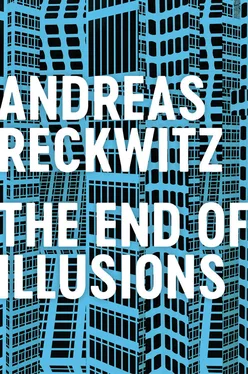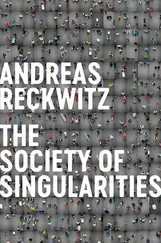1 Cover
2 Title Page The End of Illusions Politics, Economy, and Culture in Late Modernity Andreas Reckwitz Translated by Valentine A. Pakis polity
3 Copyright Page
4 Figures and Tables Figures Tables
5 Introduction: The Disillusioned Present Progress, Dystopia, Nostalgia Disillusionment as an Opportunity From Industrial Modernity to the Society of Singularities Notes
6 1 Cultural Conflicts as a Struggle over Culture: Hyperculture and Cultural Essentialism The Culturalization of the Social Culturalization I: Hyperculture Culturalization II: Cultural Essentialism Hyperculture and Cultural Essentialism: Between Coexistence and Conflict “Doing Universality” – The Culture of the General as an Alternative? Notes
7 2 From the Leveled Middle-Class Society to the Three-Class Society: The New Middle Class, the Old Middle Class, and the Precarious Class The Global and Historical Context Underlying Conditions: Post-Industrialization, the Expansion of Education, a Shift in Values In the Paternoster Elevator of the Three-Class Society The New Middle Class: Successful Self-Actualization and Urban Cosmopolitanism The Old Middle Class: Sedentariness, Order, and Cultural Defensiveness The Precarious Class: Muddling Through and Losing Status The Upper Class: Distance due to Assets Cross-Sectional Characteristics: Gender, Migration, Regions, Milieus A Trend toward Political Polarization and Future Social Scenarios Notes
8 3 Beyond Industrial Society: Polarized Post-Industrialism and Cognitive-Cultural Capitalism The Rise and Fall of Industrial Fordism The Saturation Crisis The Production Crisis and Polarized Post-Industrialism Globalization, Neoliberalism, Financialization Cognitive Capitalism and Immaterial Capital Cultural Goods and Cultural Capitalism Winner-Take-All Markets: The Scalability and Attractiveness of Cognitive and Cultural Goods Extreme Capitalism: The Economization of the Social Notes
9 4 The Weariness of Self-Actualization: The Late-Modern Individual and the Paradoxes of Emotional Culture From Self-Discipline to Self-Actualization Successful Self-Actualization: An Ambitious Dual Structure The Culture of Self-Actualization as a Generator of Negative Emotions Ways Out of the Spiral of Disappointment? Notes
10 5 The Crisis of Liberalism and the Search for the New Political Paradigm: From Apertistic to Regulatory Liberalism Political Paradigms and Political Paradoxes Problems and Solutions: Between the Paradigms of Regulation and Dynamization The Rise of the Social-Corporatist Paradigm The Crisis of Overregulation The Rise of the Paradigm of Apertistic Liberalism The Threefold Crisis of Apertistic Liberalism Populism as a Symptom “Regulatory Liberalism” as the Paradigm of the Future? Challenges Facing Regulatory Liberalism Notes
11 Bibliography
12 Index
13 End User License Agreement
1 Chapter 1 Table 1.1 Relations between Culturalization I and Culturalization II
2 Chapter 5Table 5.1 The left–right distinction and political paradigmsTable 5.2 Political paradigms and social problems since 1945
1 Chapter 2 Figure 2.1 The social structure of West Germany in 1965.Figure 2.2 Percentage of the US population older than 25 who completed high school or colle...Figure 2.3 The three-class structure of late-modern society.Figure 2.4 Socio-cultural milieus according to the SINUS studies and their “translat...
2 Chapter 3Figure 3.1 The development of employment and GDP in the Federal Republic of Germany, 1950...Figure 3.2 Technological revolutions since 1770 (a graph based on the work of Carlota Perez...Figure 3.3 The percentage change in employment share by job-quality decile in OECD countrie...Figure 3.4 The development of investment in tangible and intangible capital relative to GDP...Figure 3.5 The pyramid of goods.
1 Cover
2 Table of Contents
3 Begin Reading
1 iii
2 iv
3 vii
4 viii
5 1
6 2
7 3
8 4
9 5
10 6
11 7
12 8
13 9
14 10
15 11
16 12
17 13
18 14
19 15
20 16
21 17
22 18
23 19
24 20
25 21
26 22
27 23
28 24
29 25
30 26
31 27
32 28
33 29
34 30
35 31
36 32
37 33
38 34
39 35
40 36
41 37
42 38
43 39
44 40
45 41
46 42
47 43
48 44
49 45
50 46
51 47
52 48
53 49
54 50
55 51
56 52
57 53
58 54
59 55
60 56
61 57
62 58
63 59
64 60
65 61
66 62
67 63
68 64
69 65
70 66
71 67
72 68
73 69
74 70
75 71
76 72
77 73
78 74
79 75
80 76
81 77
82 78
83 79
84 80
85 81
86 82
87 83
88 84
89 85
90 86
91 87
92 88
93 89
94 90
95 91
96 92
97 93
98 94
99 95
100 96
101 97
102 98
103 99
104 100
105 101
106 102
107 103
108 104
109 105
110 106
111 107
112 108
113 109
114 110
115 111
116 112
117 113
118 114
119 115
120 116
121 117
122 118
123 119
124 120
125 121
126 122
127 123
128 124
129 125
130 126
131 127
132 128
133 129
134 130
135 131
136 132
137 133
138 134
139 135
140 136
141 137
142 138
143 139
144 140
145 141
146 142
147 143
148 144
149 145
150 146
151 147
152 148
153 149
154 150
155 151
156 152
157 153
158 154
159 155
160 156
161 157
162 158
163 159
164 160
165 161
166 162
167 163
168 164
169 165
170 166
171 167
172 168
173 169
174 185
175 186
176 187
177 188
178 189
179 190
180 191
181 192
182 193
183 194
184 195
185 196
186 197
187 198
188 199
189 200
190 201
191 202
The End of Illusions
Politics, Economy, and Culture in Late Modernity
Andreas Reckwitz
Translated by Valentine A. Pakis
polity
Originally published in German as Das Ende der Illusionen – Politik, Ökonomie und Kultur in der Spätmoderne © Suhrkamp Verlag Berlin 2019. All rights by and controlled through Suhrkamp Verlag Berlin.
This English edition © Polity Press, 2021
The translation of this work was supported by a grant from the Goethe-Institut.

Figure 2.1 ‘Hausmodell’ from Ralf Dahrendorf: Gesellschaft und Demokratie in Deutschland © 1965 Piper Verlag GmbH, München
Figure 3.3 from Maarten Goos and Alan Manning, “Lousy and Lovely Jobs: The Rising Polarization of Work in Britain,” The Review of Economics and Statistics , 89:1 (February, 2007), pp. 118–33. © 2007 by the President and Fellows of Harvard College and the Massachusetts Institute of Technology.
Читать дальше










